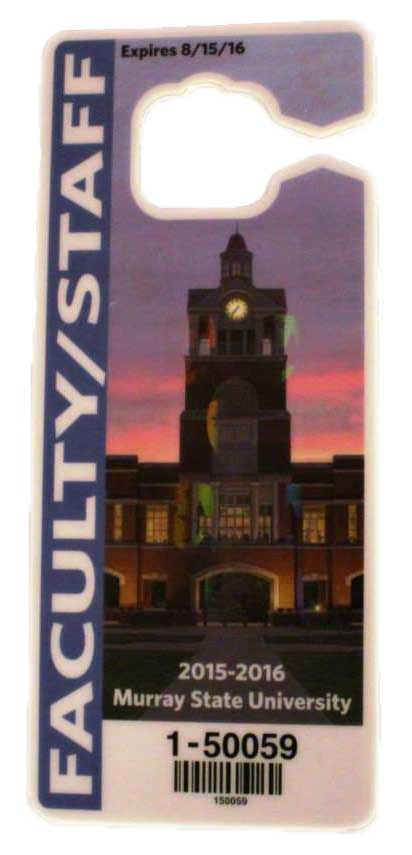The first batch of parking passes were ordered without specified dimensions, costing Public Safety and Emergency Management $14,000.
The second order was another $9,000.
By Bailey Bohannan, Staff writer

Murray State spent more than $14,000 this year on parking passes that were too big for drivers to use safely and had to be replaced.
The first round of passes ordered by Murray State were 7.5” x 3.5” – about two inches longer than the parking passes generally ordered.
David Burdette, Chief Facilities Officer, said in the first order, the desired dimensions of the parking passes were not specified, so the printing company, Weldon, Williams and Lick Inc., used the custom dimensions they assign for hanging tags.
“There was a checklist for size and it just got overlooked,” Burdette said. “A simple human error.”
The University spent $14,101 April 29 on the first batch of passes and paid $9,185 in August to reprint the smaller versions, according to purchases orders The Murray State News obtained through an open records request.
Murray State places an order for parking passes annually. Each year staff in Public Safety and Emergency Management are responsible for filing the order, having it approved, placing the order and receiving the tags.
However, this year this process had to be repeated just 28 days before the fall semester started to replace the first order of tags. In addition, the University paid $99 to have the passes shipped over night to arrive by Aug. 10, according to the purchase orders.
“The tags that were delivered were a safety hazard,” said President Bob Davies. “They would not suffice. I did not feel comfortable having those be used, so I said ‘re-order them.’”
Davies said he first noticed the problem when he went to pick up his own parking pass during the summer.
“I saw it and I went ‘What the heck is this?’” he said. “I talked to a couple of other people and got similar responses.”
Interim Chief Roy Dunaway said Public Safety tried to invent a way to make the parking passes work without having to order a replacement set, but the passes were too big, leaving no other choice but to re-order the tags.
The human error posed two problems for Murray State officials: disposing of the unusable parking tags and coming up with the money to reprint them.
They recycled the oversized passes, and Davies said the financial burden of the error would have to come out of Public Safety’s budget.
“We’re not transferring funds over to make them whole or increasing fees to make them whole or anything else,” he said. “They’ve got to eat it.”
Burdette said next summer there will be less maintenance done on Murray State’s current parking lots to compensate for the money lost from the initial order of parking passes.
“The parking hangtag revenue goes into what we call the parking account – which is for maintaining of the lots, maintains lights, parking signs – we will just spend roughly $14,000 less next year,” he said.
Davies said for him, the decision was based on the safety of students, faculty and staff at Murray State.
“There is no question,” he said. “We would have had a car accident or two – or three, or four.”
The enlarged tags were considered a safety hazard because they were an obstruction of vision for the driver. The passes themselves came with special instructions for using them.
Faith Haley, freshman from Benton, Kentucky, said although it was a human error that could happen to anyone, it is still a problem for Murray State students.
“If the students have to make up [for their error], then that would stink,” she said. “It’s already $75 just to park.”
Ashlin Kendrick, freshman from Harrodsburg, Kentucky, said she was worried that rates might increase in the future because of the error.
“It’s their mistake,” she said. “So if they find their own way to fix it then that would be better.”
Davies said he has made his opinion on the matter very clear.
“Is it a mistake? Absolutely. Am I happy about it? Absolutely not,” he said. “But we’ve got to move forward.”



























































































